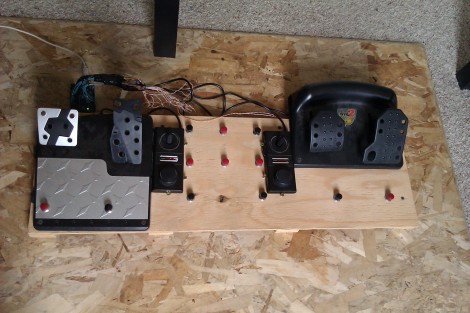
[Jon] will be tapping away with his toes during gaming session thanks to this foot controller which is packed with buttons and sensors. It’s the second iteration of the build. The original had some solder joints break and the USB stopped working. He had also been experiencing some erratic behavior and so he decided to upgrade the control hardware and add a few more things in the process.
This version uses an Arduino Uno as the interface board. He did a bunch of prototyping to find the best way to hook up all the analog sensors, and how to properly debounce the buttons. Once he was happy with the inputs he set about finding a better way to use the USB HID standard with the device. We were surprised to hear that the ATmega16u2 (one of the new AVR chips which includes USB hardware) doesn’t play nicely with Linux. But [Jon] managed to hack his way around that issue and now he’s gaming with an even better foot controller than before.















I suspect the link is currently wrong. It took me to the video for the previous article. Otherwise, looks cool!
Here’s the correct link: http://blog.asdfa.net/foot-controller-v2/
A fascinating read! Thanks for the link correction.
thanks, link updated.
I was like “Cool”, until I saw that this was put together to save its designer the effort of using his left hand on the keyboard.
Still a neat hack — though from a foot-operated UI perspective all those tiny little indistinguishable buttons would seem to be something of a disaster — but now I’m like “Seriously? All this because you couldn’t be bothered to take your other hand out of neutral?”
Well some people can lack an arm, and this system (like the Def Leppard drums) is interesting and can be tweaked into a very wide number of use.
Maybe he’s…. you know…. busy… with his other arm. =/
Pffft, it’s not a Linux problem, just dfu-programmer hasn’t been updated in the repositories for a while so hasn’t got support for parts that weren’t available until recently. Actually, atmega8u2 is supported in the latest release of Ubuntu, as is atmega16u4.
Fixing it properly would entail adding a line into the source for dfu-programmer and recompiling it.
A better option is to replace the Atmel firmware with one of the three excellent boot loaders provided free with LUFA, but you need a programmer to do it.